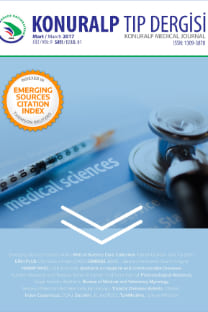Asistan Hekimlerin Olumsuz İlaç Reaksiyonları Konusundaki Bilgi ve Tutumları
Knowledge and Attitudes of Resident Physicians about Adverse Drug Reactions
___
- 1. Farcas A, Bojita M. Adverse drug reactions in clinical practice: a causality assessment of a case of druginduced pancreatitis. J Gastrointestin Liver Dis. 2009;18(3):353-8.
- 2. World Health Organization. Quality A, Safety of Medicines T. Safety of medicines : a guide to detecting and reporting adverse drug reactions : why health professionals need to take action. Geneva: World Health Organization; 2002.
- 3. Passarelli MCG, Jacob-Filho W, Figueras A. Adverse drug reactions in an elderly hospitalised population. Drugs & aging. 2005;22(9):767-77.
- 4. Leape LL. Error in medicine. Jama. 1994;272(23):1851-7.
- 5. Aykaç E, editor Farmakovijilansa Bakış ve Türkiye Farmakovijilans Merkezinin Çalışmaları. 12 Ulusal Aile Hekimliği Kongresi; 15-19 May 2013; Kuşadası-Aydin.
- 6. Brewer T, Colditz GA. Postmarketing surveillance and adverse drug reactions: current perspectives and future needs. Jama. 1999;281(9):824-9.
- 7. Pirmohamed M, James S, Meakin S, Green C, Scott AK, Walley TJ, et al. Adverse drug reactions as cause of admission to hospital: prospective analysis of 18 820 patients. Bmj. 2004;329(7456):15-9.
- 8. Lazarou J, Pomeranz BH, Corey PN. Incidence of adverse drug reactions in hospitalized patients: a metaanalysis of prospective studies. Jama. 1998;279(15):1200-5.
- 9. Ozcan G, Aykac E, Kasap Y, Nemutlu NT, Sen E, Aydinkarahaliloglu ND. Adverse drug reaction reporting pattern in Turkey: analysis of the national database in the context of the first pharmacovigilance legislation. Drugs-real world outcomes. 2016;3(1):33-43.
- 10.Dormann H, Muth-Selbach U, Krebs S, Criegee-Rieck M, Tegeder I, Schneider HT, et al. Incidence and costs of adverse drug reactions during hospitalisation. Drug safety. 2000;22(2):161-8.
- 11.Türkiye İlaç ve Tıbbi Cihaz Kurumu TÜFAM. İyi Farmakovijilans Uygulamaları (İFU) Kılavuzu Modül I– Advers ilaç reaksiyonlarının yönetimi ve bildirimi. 2014 [cited 2020 June 20]. Available from: https://www.titck.gov.tr/Dosyalar/Ilac/Farmakovijilans/%C4%B0FU%20Mod%C3%BCl%20I.pdf.
- 12.Waller PC. Making the most of spontaneous adverse drug reaction reporting. Basic & clinical pharmacology & toxicology. 2006;98(3):320-3.
- 13.Dhikav V, Singh S, Anand K. Adverse drug reaction monitoring in India. J Indian Acad Clin Med. 2004;5(1):27-33.
- 14.Şencan N, Altınkaynak M, Ferah I, Özyıldırım A, Ceylan EM, Clark PM. The knowledge and attitudes of physicians and nurses towards adverse event reporting and the effect of pharmacovigilance training: A hospital experience. Hacettepe Üniversitesi Eczacılık Fakültesi Dergisi. 2010; 1:25-40.
- 15.Ergün Y, Ergün TB, Toker E, Ünal E, Akben M. Knowledge attitude and practice of Turkish health professionals towards pharmacovigilance in a university hospital. International health. 2019;11(3):177-84.
- 16.Güner MD, Ekmekci PE. Healthcare professionals’ pharmacovigilance knowledge and adverse drug reaction reporting behavior and factors determining the reporting rates. Journal of drug assessment. 2019;8(1):13-20.
- 17.Paveliu MS, Bengea-Luculescu S, Mihai T, Paveliu SF. Perception on adverse drug reaction reporting by physicians working in southern Romania. Maedica. 2013;8(1):17-25.
- 18.Singh J, Singh H, Rohilla R, Kumar R, Gautam C. Lack of awareness of pharmacovigilance among young health-care professionals in India: An issue requiring urgent intervention. International Journal of Applied and Basic Medical Research. 2018;8(3):158-63.
- 19.Stoynova V, Getov IN, Naseva EK, Lebanova HV, Grigorov EE. Physicians' knowledge and attitude towards adverse event reporting system and result to intervention--randomized nested trial among Bulgarian physicians. Medicinski Glasnik. 2013;10(2):365-72.
- 20.Altıntaş Aykan D, Nazik H, Ergün Y. Advers İlaç Reaksiyonları Spontan Bildirimlerinin Değerlendirilmesi: Klinik Farmakoloji Deneyimimiz. Kocaeli Tıp Dergisi. 2019;8(2):230-9.
- 21.Palaian S, Ibrahim MI, Mishra P. Health professionals' knowledge, attitude and practices towards pharmacovigilance in Nepal. Pharmacy practice. 2011; 9(4):228-35.
- 22.Khan SA, Goyal C, Chandel N, Rafi M. Knowledge, attitudes, and practice of doctors to adverse drug reaction reporting in a teaching hospital in India: An observational study. Journal of natural science, biology, and medicine. 2013;4(1):191-6.
- 23.Oshikoya KA, Awobusuyi JO. Perceptions of doctors to adverse drug reaction reporting in a teaching hospital in Lagos, Nigeria. BMC clinical pharmacology. 2009;9(1):14.
- 24.Fincham J. A statewide program to stimulate reporting of adverse drug reactions. Journal of pharmacy practice. 1989;2(4):239-44.
- 25.McGettigan P, Golden J, Conroy R, Arthur N, Feely J. Reporting of adverse drug reactions by hospital doctors and the response to intervention. British journal of clinical pharmacology. 1997;44(1):98-100.
- 26.Figueiras A, Herdeiro MT, Polónia J, Gestal-Otero JJ. An educational intervention to improve physician reporting of adverse drug reactions: a cluster-randomized controlled trial. Jama. 2006;296(9):1086-93.
- 27.Necho W, Worku A. Assessment of knowledge, attitude and practice of health professionals towards adverse drug reaction reporting and factors associated with reporting. J Pharmacovigilance. 2014;2(4):135. doi:10.4172/2329-6887.1000135
- 28.Asseray N, Ballereau F, Trombert-Paviot B, Bouget J, Foucher N, Renaud B, et al. Frequency and severity of adverse drug reactions due to self-medication: a cross-sectional multicentre survey in emergency departments. Drug safety. 2013;36(12):1159-68.
- 29.Schmiedl S, Rottenkolber M, Hasford J, Rottenkolber D, Farker K, Drewelow B, et al. Self-medication with over-the-counter and prescribed drugs causing adverse-drug-reaction-related hospital admissions: results of a prospective, long-term multi-centre study. Drug safety. 2014;37(4):225-35.
- ISSN: 1309-3878
- Yayın Aralığı: 3
- Başlangıç: 2009
- Yayıncı: Düzce Üniversitesi Tıp Fakültesi Aile Hekimliği AD adına Yrd.Doç.Dr.Cemil Işık Sönmez
Asistan Hekimlerin Olumsuz İlaç Reaksiyonları Konusundaki Bilgi ve Tutumları
Belgin ALASEHIRLI, Elif OGUZ, Şenay KOÇAKOĞLU, Dursun ÇADIRCI, Elif Burcu Yavuz DAĞLIOĞLU
Pelin YILDIZ, Fatma Cavide SÖNMEZ, Zeynep TOSUNER, Emre AYTUĞAR
The Effect of Ozone Treatment on Thermal Burn Wound Healing; an Experimental Study
Kemal PEKER, İsmayil, İsmail DEMİRYILMAZ, İsmail, İlyas, Cebrail, Murat, Abdulkadir ÇOBAN
Sigara Bağımlılığında Aile Terapisi: 7 Olgu Sunumu
Işılay GEDİK TEKİNEMRE, Serap SERTKAYA, Burcu KAYHAN TETİK
Septorinoplasti ameliyatlarında trigeminokardiyak refleks, QT, QTc ve anestezi ilişkisi
İ̇smail, İlknur YORULMAZ, Onur ÖZLÜ, Derya, Fatih AKCAN, Pelin
Hicran DOĞRU, Onur Burak DURSUN, Nurşah ÖZTEKİN
Bir Üniversitenin Eğitim Aile Sağlığı Merkezlerinde Aşı Reddi
Mehmet, Gökburak, Furkan, YASEMİN ÇAYIR
Ozon Tedavisinin Termal Yanık Yara İyleşmesine Etkisi; Deneysel bir Çaşlışma
Kemal PEKER, İsmayil YILMAZ, İsmail DEMİRYILMAZ, Arda ISIK, İlyas SAYAR, Cebrail GÜRSUL, Murat ÇANKAYA, Taha Abdulkadir ÇOBAN
Primer Dismenore ile Baş etmek için Kullanılan Yöntemler ve Kinezyofobinin Ağrı Şiddeti ile ilişkisi
Hanife, Melike DEMİR ÇALTEKİN, Taylan ONAT, Demet AYDOĞAN KIRMIZI, Emre BASER, Ethem Serdar YALVAÇ
